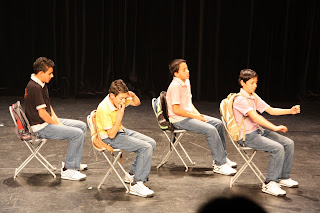4th Meeting in Vienna
Output of our 4th meeting in Vienna, 16-18 October 2010
Participants: Ulrich Diermann, Institut equalita e.V. (Köln); Bettina Kocher, Ralf Classen, Büro für Kultur und Medienprojekte/KinderKulturKarawane (Hamburg); Erika Köchl, VIDC (Wien); Anita Ramsak, Ekvilib Institute (Ljubljana); Alena Krempaska, People against Racism (Bratislava); Miglena Molhova and Zornitsa Staneva, Foundation for Development of the Cultural and Business Potential of Civil Society (Sofia).
Friday, 16.10.2010
After their arrival to Vienna the partners attend a performance and discussion of the YES Theater from Palestine in DSCHUNGEL WIEN Theater in MuseumsQuartier, Museumsplatz.
Saturday, 17.10.2010
The partners discuss the idea of peer learning
- What can the peer learning approach offer to the educational system.
- Target group – peer learning for managers/leaders/directors of youth groups.
- General framework for distributing knowledge to other peer learners.
- Intercultural competences and social competences of young adult learners.
- The cultural approach being a key for peer learning.
The partners continue with evaluation of the experiences of the KinderKulturKarawane groups.
At 11.00 arrives Grupo YAURI from Bolivia for an evaluation workshop with the partners.
Bettina makes a presentation on the Grundtvig Partnership project. She explains what peer learning is and makes comparisons between the work of the partners and what the youths from the group are doing when they perform before their peers. She expresses the partners need to understand more about the experiences of YAURI in the workshops and the performances.
The partners present themselves – organization, activities, country, etc.
The group members also introduce themselves.
The YAURI group presents some background information on the project. 20 years ago several street children who started with a theatre project. Now a cultural centre for young people is set up. This is an initiative of the youths, the youth leaders. Young people directing their efforts to other young people (= peer learning). They work with theatre, music, dance, circus, plastic arts. The centre is settled in a marginalized neighbourhood and the members of YAURI want to bring all their talents to the youths/kids in this neighbourhood. They want to explore the body in order to empower their peers to become able to express themselves in any kind of situation or setting – this is why they use theatre, circus, etc. In Latin America the youths are not given much importance when art and culture is in question. The government does not give it enough importance, on the contrary.
A discussion on experiences and expectations follows.
After lunch break the partners continue with an evaluation meeting with the YES Theatre.
The children who act in the theatre present themselves (three 13 years old boys and one 16 years old boy).The teachers and guide also present themselves.
A discussion about the experiences of the YES Theatre follows, as well as some briefing on Palestinian reality and problems.
After fixing the dates for the next virtual (3 December 2010, 10am DE time) and real meetings (Bratislava. 27-28 January 2011, Ljubljana – 6-8 April 2011, Hamburg– 15 – 18 June 2011) the partners join a performance and discussion with Yauri in Cult Café, a youth center with mostly young people with migrant background.
18 October 2010
The partners attend a YAURI workshop with school children at Dschungel.
The partners make a resume of the YAURI workshop. All partners are quite happy with their workshop. They liked the fact that the Yauri group had a methodology, they had a plan of what and how they should do. Luis - the young person leading the workshop - was flexible enough to change the exercises when he saw that he wasn’t getting anywhere with a certain activity.
Evaluation of the Baobab workshop from Cologne follows.
In the last part of the meeting the partners go on to work on the case studies and the compendium









































